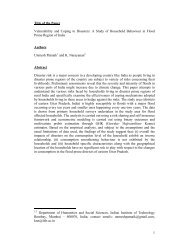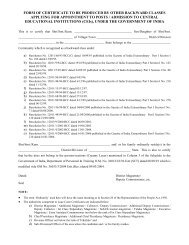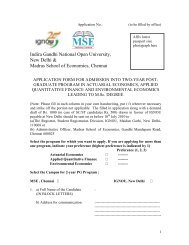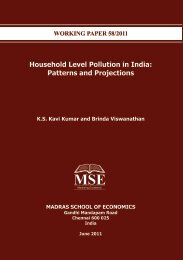Science and Economics for Sustainable Development of India
Science and Economics for Sustainable Development of India
Science and Economics for Sustainable Development of India
Create successful ePaper yourself
Turn your PDF publications into a flip-book with our unique Google optimized e-Paper software.
SCIENTIFIC TEMPER AND SCIENCE AND TECHNOLOGYPOLICY IN INDIAJawaharlal Nehru, the first Prime Minister <strong>of</strong> <strong>India</strong>, crusaded <strong>for</strong> scientifictemper. The 42nd Amendment Part IV-A Article 51-A (h) in 1976 onFundamental Duties reads: (It shall be the duty <strong>of</strong> every citizen <strong>of</strong> <strong>India</strong>)to develop the scientific temper, humanism <strong>and</strong> the spirit <strong>of</strong> inquiry <strong>and</strong>re<strong>for</strong>m. Sen (2006), <strong>Economics</strong> Nobel Laureate, says scientific temperinvolves the application <strong>of</strong> logic <strong>and</strong> reasoning, <strong>and</strong> the avoidance <strong>of</strong> bias<strong>and</strong> preconceived notions in arriving at decisions, <strong>and</strong> becomesparticularly valuable while deciding what is best <strong>for</strong> the community or thenation. According to him a group that practices the scientific temper hastwo characteristics – internal pluralism <strong>and</strong> external receptivity. Ramesh(2011), <strong>for</strong>mer Minister <strong>of</strong> Environment <strong>and</strong> Forests, says that ‗theessence <strong>of</strong> Nehru‘s fixation on scientific temper was this—a questioningmind, pushing the limits, not getting encumbered or structured by narrowlimited concerns, not afraid to be inconsistent with changing facts <strong>and</strong>circumstances but always proceeding on the basis <strong>of</strong> objective realities,not prisoner <strong>of</strong> any dogma, modern or archaic‘. Thus, openness,neutrality, receptivity to changing facts <strong>and</strong> objectivity characterize thescientific temper.The Scientific Policy Resolution <strong>of</strong> 1958 <strong>and</strong> the TechnologyPolicy Statement <strong>of</strong> 1983 emphasize self-reliance, as also sustainable <strong>and</strong>equitable development. <strong>Science</strong> <strong>and</strong> Technology Policy <strong>of</strong> 2003 notes that‗science <strong>and</strong> technology have had unprecedented impact on economicgrowth <strong>and</strong> social development. Knowledge has become a source <strong>of</strong>economic might <strong>and</strong> power. This has led to increased restrictions onsharing <strong>of</strong> knowledge, to new norms <strong>of</strong> intellectual property rights, <strong>and</strong>to global trade <strong>and</strong> technology control regimes. Scientific <strong>and</strong>technological developments today also have deep ethical, legal <strong>and</strong> socialimplications‘ (Government <strong>of</strong> <strong>India</strong>, 2003). Narasimha (2008) examines2


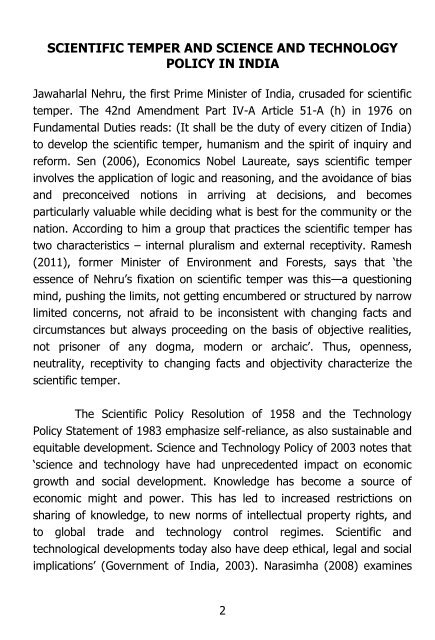
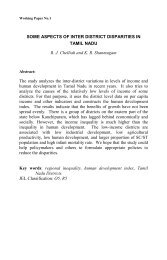
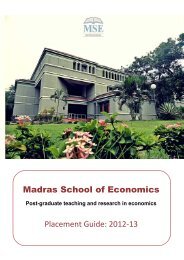
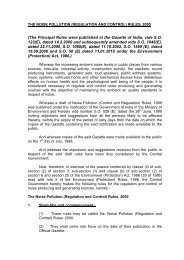
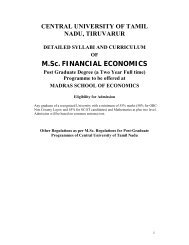
![Curriculum Vitae [pdf] - Madras School of Economics](https://img.yumpu.com/49878970/1/190x245/curriculum-vitae-pdf-madras-school-of-economics.jpg?quality=85)
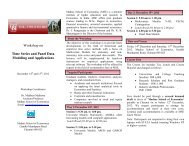
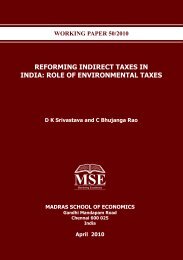
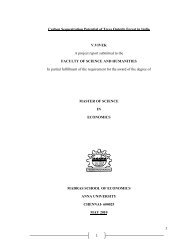
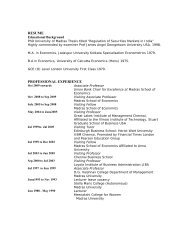
![Curriculum Vitae [pdf] - Madras School of Economics](https://img.yumpu.com/48715201/1/184x260/curriculum-vitae-pdf-madras-school-of-economics.jpg?quality=85)
